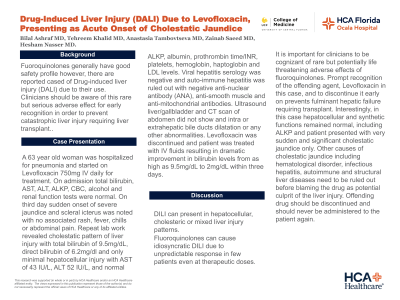Back


Poster Session B - Monday Morning
Category: Liver
B0556 - Drug-Induced Liver Injury (DALI) Due to Levofloxacin, Presenting as Acute Onset of Cholestatic Jaundice: A Case Report
Monday, October 24, 2022
10:00 AM – 12:00 PM ET
Location: Crown Ballroom

Has Audio

Bilal Ashraf, MD
UCF College of Medicine-HCA GME Consortium/HCA Florida Ocala Hospital
Ocala, FL
Presenting Author(s)
Bilal Ashraf, MD, Tehreem Khalid, MD, Anastasia Tambovtseva, MD, Zainab Saeed, MD, Hesham Nasser, MD
UCF College of Medicine-HCA GME Consortium/HCA Florida Ocala Hospital, Ocala, FL
Introduction: Fuoroquinolones generally have good safety profile however, there are reported cased of Drug-induced liver injury (DALI) due to their use. Clinicians should be aware of this rare but serious adverse effect for early recognition in order to prevent catastrophic liver injury requiring liver transplant.
Case Description/Methods: A 63 year old woman was hospitalized for pneumonia and started on Levofloxacin 750mg IV daily for treatment. On admission total bilirubin, AST, ALT, ALKP, CBC, alcohol and renal function tests were normal. On third day sudden onset of severe jaundice and scleral icterus was noted with no associated rash, fever, chills or abdominal pain. Repeat lab work revealed cholestatic pattern of liver injury with total bilirubin of 9.5mg/dL, direct bilirubin of 6.2mg/dl and only minimal hepatocellular injury with AST of 43 IU/L, ALT 52 IU/L, and normal ALKP, albumin, prothrombin time/INR, platelets, hemoglobin, haptoglobin and LDL levels. Viral hepatitis serology was negative and auto-immune hepatitis was ruled out with negative anti-nuclear antibody (ANA), anti-smooth muscle and anti-mitochondrial antibodies. Ultrasound liver/gallbladder and CT scan of abdomen did not show and intra or extrahepatic bile ducts dilatation or any other abnormalities. Levofloxacin was discontinued and patient was treated with IV fluids resulting in dramatic improvement in bilirubin levels from as high as 9.5mg/dL to 2mg/dL within three days.
Discussion: DILI can present in hepatocellular, cholesteric or mixed liver injury patterns.
Fluoroquinolones can cause idiosyncratic DILI due to unpredictable response in few patients even at therapeutic doses. It is important for clinicians to be cognizant of rare but potentially life threatening adverse effects of fluoroquinolones. Prompt recognition of the offending agent, Levofloxacin in this case, and to discontinue it early on prevents fulminant hepatic failure requiring transplant. Interestingly, in this case hepatocellular and synthetic functions remained normal, including ALKP and patient presented with very sudden and significant cholestatic jaundice only. Other causes of cholestatic jaundice including hematological disorder, infectious hepatitis, autoimmune and structural liver diseases need to be ruled out before blaming the drug as potential culprit of the liver injury. Offending drug should be discontinued and should never be administered to the patient again.
Disclosures:
Bilal Ashraf, MD, Tehreem Khalid, MD, Anastasia Tambovtseva, MD, Zainab Saeed, MD, Hesham Nasser, MD. B0556 - Drug-Induced Liver Injury (DALI) Due to Levofloxacin, Presenting as Acute Onset of Cholestatic Jaundice: A Case Report, ACG 2022 Annual Scientific Meeting Abstracts. Charlotte, NC: American College of Gastroenterology.
UCF College of Medicine-HCA GME Consortium/HCA Florida Ocala Hospital, Ocala, FL
Introduction: Fuoroquinolones generally have good safety profile however, there are reported cased of Drug-induced liver injury (DALI) due to their use. Clinicians should be aware of this rare but serious adverse effect for early recognition in order to prevent catastrophic liver injury requiring liver transplant.
Case Description/Methods: A 63 year old woman was hospitalized for pneumonia and started on Levofloxacin 750mg IV daily for treatment. On admission total bilirubin, AST, ALT, ALKP, CBC, alcohol and renal function tests were normal. On third day sudden onset of severe jaundice and scleral icterus was noted with no associated rash, fever, chills or abdominal pain. Repeat lab work revealed cholestatic pattern of liver injury with total bilirubin of 9.5mg/dL, direct bilirubin of 6.2mg/dl and only minimal hepatocellular injury with AST of 43 IU/L, ALT 52 IU/L, and normal ALKP, albumin, prothrombin time/INR, platelets, hemoglobin, haptoglobin and LDL levels. Viral hepatitis serology was negative and auto-immune hepatitis was ruled out with negative anti-nuclear antibody (ANA), anti-smooth muscle and anti-mitochondrial antibodies. Ultrasound liver/gallbladder and CT scan of abdomen did not show and intra or extrahepatic bile ducts dilatation or any other abnormalities. Levofloxacin was discontinued and patient was treated with IV fluids resulting in dramatic improvement in bilirubin levels from as high as 9.5mg/dL to 2mg/dL within three days.
Discussion: DILI can present in hepatocellular, cholesteric or mixed liver injury patterns.
Fluoroquinolones can cause idiosyncratic DILI due to unpredictable response in few patients even at therapeutic doses. It is important for clinicians to be cognizant of rare but potentially life threatening adverse effects of fluoroquinolones. Prompt recognition of the offending agent, Levofloxacin in this case, and to discontinue it early on prevents fulminant hepatic failure requiring transplant. Interestingly, in this case hepatocellular and synthetic functions remained normal, including ALKP and patient presented with very sudden and significant cholestatic jaundice only. Other causes of cholestatic jaundice including hematological disorder, infectious hepatitis, autoimmune and structural liver diseases need to be ruled out before blaming the drug as potential culprit of the liver injury. Offending drug should be discontinued and should never be administered to the patient again.
Disclosures:
Bilal Ashraf indicated no relevant financial relationships.
Tehreem Khalid indicated no relevant financial relationships.
Anastasia Tambovtseva indicated no relevant financial relationships.
Zainab Saeed indicated no relevant financial relationships.
Hesham Nasser indicated no relevant financial relationships.
Bilal Ashraf, MD, Tehreem Khalid, MD, Anastasia Tambovtseva, MD, Zainab Saeed, MD, Hesham Nasser, MD. B0556 - Drug-Induced Liver Injury (DALI) Due to Levofloxacin, Presenting as Acute Onset of Cholestatic Jaundice: A Case Report, ACG 2022 Annual Scientific Meeting Abstracts. Charlotte, NC: American College of Gastroenterology.
